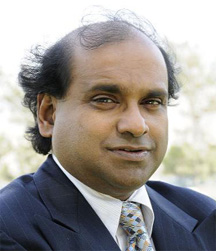US Regional Environmental Officer Indran J Amirthanayagam believes that the ordinary person still does not sufficiently understand what REDD (Reducing Emissions from Deforestation and Forest Degradation) is, and this must change if they are to contribute to sustainable development in countries like Guyana.
Further, he said, forest conservation is not meant to be done in a Utopian setting, where the resources are locked away and untouched.
“You cannot put a lock on the forest. We have to respect the relationship that the [persons living there] have with the forests we have to be engaged in a proactive way to manage in a sustainable manner,” he said in an interview with Stabroek News last week.

The US Government through the United States Agency for International Development (USAID) has been active in Guyana’s forestry sector, collaborating with the Ministry of Agriculture and has also worked with Amerindian communities. Deputy Chief of Mission Thomas Pierce, who was present at the interview with Amirthanayagam, said that through some of their projects, visitors have come to Guyana to engage in sports fishing on a catch and release basis and this is providing employment for local persons and giving them a chance to have an alternative way of earning.
Amirthanayagam, based at the US Embassy in Lima, Peru, was in Guyana to engage with various stakeholders in the natural resources and the environmental sectors as the US seeks to further deepen its relations with Guyana and provide expertise in these areas. Over the course of his visit, he met officials from the Iwokrama International Centre, WWF Guianas, Conservation International Guyana, the Office of Climate Change and the Ministry of Natural Resources and Environment.
“We have resources to offer and we want to offer them as part of our neighbourly relations,” he said, of the purpose of his visit.
On the state of global climate negotiations, Amirthanayagam spoke of the US’ intervention in the area of climate change funding and said that with President Barack Obama’s engagements at COP 15 in Copenhagen, Denmark in 2009, the United States has built upon the Copenhagen Accord and Cancun Agreement in 2010 and the Durban Platform in 2011.
Amirthanayagam said the United States is aiming to reduce its emissions by 17 per cent by 2020 using year 2005 as the baseline level. The Kyoto Protocol calls for Annex 1 countries to reduce by various percentages by 2020 using 1990 as the baseline year.
He said that the US was very involved in the process of the Kyoto Protocol in the first place but he said that Congress did not ratify the Protocol, explaining that there are many ways of achieving the low emissions that the protocol calls for.
“We are not a party to the Kyoto Protocol so we cannot say [what is happening with it]. Our interest is in reducing emissions although the method to get there may be different,” he said.
He pointed out that the goal of the Durban plan was to limit temperature increases to 2 degrees Celsius. “That is still the number that we are working with,” he said, adding that in Durban the US and China both agreed to the Durban platform.
Since 2009, Amirthanayagam has directed the Regional Environment, Science, Technology and Health hub Office for South America based at the US Embassy in Lima. In addition he pioneered the website reosouthamerica.com which presents ideas focused on making regional economies more sustainable.
Information from State Department sources said Amirthanayagam has been a member of the United States Foreign Service since 1993 and has served as Public Affairs Officer (PAO) Vancouver, Regional PAO Monterrey, PAO for South India based in Chennai, EST/Consular Officer Mexico City, Political Officer/General Services Officer Abidjan, Assistant Cultural Affairs Officer Brussels, and Junior Officer Buenos Aires.
Amirthanayagam is also a poet, essayist and blogger in English, Spanish, French and Portuguese He has published six poetry collections thus far, including The Elephants of Reckoning which won the 1994 Paterson Prize in the United States, and the Splintered Face, Tsunami Poems.
His Spanish collections include El Infierno de los Pájaros, El Hombre que Recoge Nidos and Sol Camuflado. He is also a self confessed fan of works of Roy Heath, Martin Carter and Ian McDonald.




